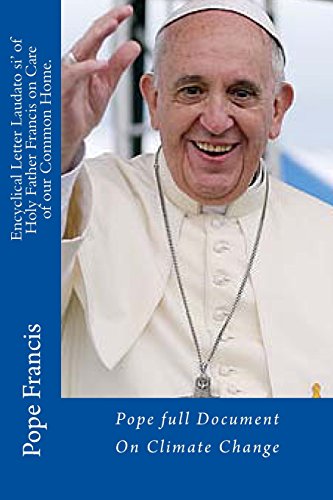In the annals of modern papal encyclicals, few documents have resonated as profoundly as Pope Francis’ “Laudato Si’: On Care for Our Common Home.” This encyclical, released in 2015, extends beyond a mere address on environmental issues; it invokes the urgency of ecological conversion framed within the rich tapestry of Christian theology. Characterized by its compelling call for a more profound reverence for creation, “Laudato Si'” urges humanity to reconsider its relationship with the environment and one another.
The title itself, “Laudato Si’,” draws inspiration from St. Francis of Assisi’s Canticle of the Creatures, illuminating the integral connection between humanity and the natural world. This work stands as a vibrant testament to Franciscan spirituality, emphasizing an eco-centric worldview that urges Christians to cherish and protect the earth as a divine gift. This framing is not merely poetic; it carries profound theological implications. It echoes the biblical exhortation to stewardship found in Genesis, where humanity is appointed as caretakers of the earth. Pope Francis emphasizes that the degradation of the environment directly impacts our fellow human beings, particularly the marginalized and disenfranchised. In this light, ecological crises become a moral challenge that requires a concerted communal response.
The encyclical commences with an earnest acknowledgment of the ecological destruction that plagues our planet. Issues such as deforestation, climate change, and pollution are presented not merely as scientific concerns but as ethical dilemmas that bear a significant spiritual dimension. Pope Francis articulates a vision of interconnectivity, one that transcends anthropocentrism—the idea that human beings are the central or most significant entities in the world. Instead, he urges a paradigm shift towards a more holistic perspective, where the welfare of humanity is inexorably tied to the health of the planet.
At the core of “Laudato Si'” lies the notion of integral ecology, a compelling synthesis of environmental, economic, and social spheres. This approach underscores the necessity of addressing ecological issues within the broader context of social justice. It implores Christians to recognize that environmental degradation often exacerbates poverty and inequality. The poor are disproportionately affected by climate-related disasters, and their voices must be central to any discourse on environmental ethics. Thus, the encyclical invites the faithful to engage in an ecological spirituality that emphasizes compassion, empathy, and collective responsibility.
Pope Francis posits that the ecological crisis is more than a technical problem; it is steeped in cultural and spiritual malaise. He critiques the prevailing exploitative paradigm driven by consumerism and rampant individualism, asserting that such attitudes degrade not only the earth but also the very fabric of human relationships. In contrast, he beckons a re-engagement with values rooted in community, solidarity, and care for creation. Each of these values calls believers to participate actively in the ongoing dialogue regarding sustainability.
The call to action in “Laudato Si'” is multifaceted. Pope Francis stresses both personal and systemic changes. On an individual level, he encourages simple acts of stewardship, such as reducing waste and cultivating a sense of gratitude for the natural world. These modest choices can culminate in significant impacts, cultivating a culture of mindfulness concerning consumption and conservation.
However, the encyclical also addresses the necessity for structural reforms. It advocates for comprehensive policies that address the root causes of environmental destruction, such as reliance on fossil fuels and unsustainable agricultural practices. Essential to this discourse is the idea of ecological economics, which recognizes the intrinsic value of nature beyond mere commodification. Pope Francis calls for a reevaluation of growth paradigms that prioritize short-term gains over long-term sustainability, encouraging societies to reimagine economic systems that align with ethical stewardship.
“Laudato Si'” resonates with the concept of a global village, emphasizing that the ecological crisis knows no borders and requires collaborative efforts transcending national interests. The encyclical appeals to the global community to forge alliances across diverse sects and cultures, fostering solidarity in the face of shared challenges. The Paris Agreement and other international environmental accords reflect this spirit of partnership. Ultimately, the encyclical dreams of a just and united global response that privileges the most vulnerable populations.
In summation, “Laudato Si’: On Care for Our Common Home” serves as a pivotal text that not only situates environmental concerns within a Christian ethical framework but also evokes a renewed sense of urgency for ecological justice. It invites believers to reimagine their role in creation, encouraging them to embrace a lifestyle marked by simplicity, reverence, and interconnectedness. As we contemplate the profound implications of this encyclical, we find ourselves beckoned into a new paradigm—a transformation that promises not merely a change in behavior but a deepened communion with the earth and the divine. The ensuing quest for ecological harmony becomes not just a practical necessity but a vital aspect of our spiritual journey towards a more compassionate, equitable, and sustainable future.



